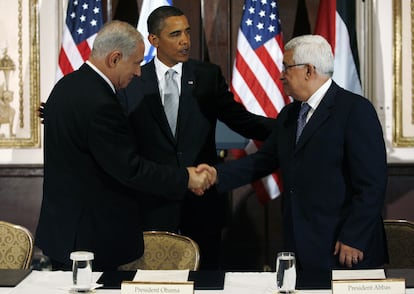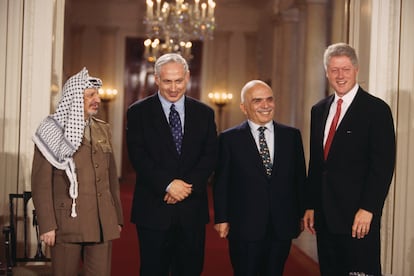Bibi: The return of ‘King’ Netanyahu
The leader who has governed Israel the longest looks set to take up the reins of power once again, after just a year and a half in the opposition and with support from the far right

The third time that his supporters chanted “Bibi, king of Israel,” Bibi – as the former prime minister and leader of the conservative Likud party Benjamin Netanyahu is popularly known – clarified from the stage where he was standing: “I am not a king, I have to be elected... and I have been, with your votes!” It was dawn on Wednesday in Jerusalem, and the exit polls were already pointing to a near-sure victory that would give back power, after just a year and a half in the opposition, to the man who has governed Israel the longest: 15 of the country’s 74-year history, longer even than founding father David Ben Gurion.
Tried for three cases of corruption, detested by old allies and branded a liar by new ones, the 73-year-old “king” has pulled the umpteenth rabbit out of his hat to achieve a comfortable majority of 65 of the 120 seats in parliament, the Knesset, with 97% of the regular votes counted.
At the election of “Bibi, yes; Bibi, no,” Israel voted yes. Or rather, only 50% of the country did, but Netanyahu benefited from the fact that many ballots cast for the opposite bloc went to parties that will not have parliamentary representation because they failed to reach the electoral threshold of 3.25% of the votes.
The Likud party has emerged the winner, increasing its parliamentary presence from 30 to 32 seats, while three allied groups – the far-right Religious Zionist Party (also known as Religious Zionism), and the religious ultranationalist Shas and United Torah Judaism – add up to 33 lawmakers. Israel has thus resolved the political blockade that have forced citizens to go to the polls five times since 2019.

One of the first consequences of the bloc’s victory is that the number of female members of government will drop from 30 to nine, mainly because the religious ultranationalist parties – which are contributing 19 of the 65 seats – only include men on their lists.
Netanyahu first came to power in 1996, a year after Isaac Rabin was assassinated by an Israeli ultranationalist for having signed the Oslo Accords with the Palestinians. At age 46, he became the youngest prime minister and the first to have been born in the State of Israel. In 1999, he was defeated by the Labor Party’s Ehud Barak.
A polarizing figure whom supporters speak about in ways that suggest a personality cult, Netanyahu embodies like few others the image, quite popular in Israel, of a strong leader of a country surrounded by enemies, one who does not accept lessons from the world. His tough rhetoric, however, does not always match his actions, such as the time when he freed the spiritual leader of Hamas Ahmed Yassin following a Mossad fiasco in Jordan in 1997, or when he exchanged the soldier Gilad Shalit for more than 1,000 Palestinian prisoners in 2011.
Netanyahu has been crucial in building Israel into an economic, military and technological powerhouse that has the backing of the West, navigates global financial crises admirably, and has amazed the world with its pace of Covid vaccinations. And all of this has taken place with the occupation of Palestine in the background. Two of his great achievements are, in fact, having established diplomatic relations with four Arab countries without giving up an inch of territory, and obtaining US recognition of Jerusalem as the capital of Israel.
Between 2009 and 2021, Netanyahu led back-to-back governments that displayed his specialty: playing it both ways. At the United Nations, he defended the creation of a Palestinian state in the face of pressure from Barack Obama, but without lifting a finger to actually achieve it. He modulated his speech and switched friends and enemies to preserve power, to the point of resorting to an excuse to break the rotation government agreement he had with Benny Gantz.

He is the only prime minister who, when faced with the dilemma of making a decision that serves his personal interests or those of the State of Israel, chooses the former. Not because he hates Israel, but because he has convinced himself that what is good for him and what is good for his country are one and the same, noted one of his main critics, the political commentator Ben Caspit, in an October article in the daily Maariv.
In fact, one of Netanyahu’s weak points is his lack of self-criticism. In his recently published autobiography Bibi, My Story, he does not even mention the worst civilian disaster in the country, which took place during his tenure: the death of 45 people caused by a crowd surge during a Jewish holiday on Mount Meron in 2021.
Another is his tendency to play the victim. “Why is Israel being treated like this? Why am I being treated like this? Why do I deserve this?” he complained after an argument with former US president Bill Clinton during the negotiation of the Wye River Memorandum in 1998, as Haaretz journalist Anshel Pfeffer recounts in his biography Bibi: The Turbulent Life and Times of Benjamin Netanyahu.

This time, Netanyahu is returning to power with a delicate load: Religious Zionism. The alliance, made up of three parties that ran on a shared list with an ultranationalist, racist and homophobic discourse, will exact a toll for its support. This alliance is responsible for the bloc’s victory after making significant gains in just one year, rising from six to 14 seats. The leader of the group, Bezalel Smotrich, was received by his followers with the chant: “The new Defense Minister has arrived,” while Itamar Ben Gvir, leader of Jewish Power, another one of the parties on the joint list, has made it public that he is angling for the National Security portfolio.
Ben Gvir defends the death penalty for “terrorists” (a label that includes individuals who throw a Molotov cocktail), deporting “disloyal” citizens, such as those who hurl stones, and granting immunity to soldiers and police. Until recently, he hung in his living room a portrait of Baruch Goldstein, the settler who killed 29 Palestinians after opening fire on a mosque in Hebron in 1994.

Aware of the concern that Ben Gvir causes in part of his country, Netanyahu adopted a conciliatory tone in his celebration speech before the barely 200 followers who remained at election headquarters at 3am. He said that he intends to form a government that “cares about all its citizens without exception” – which includes the Arab minority, in the crosshairs of Religious Zionism – and that he will carry out a “balanced and responsible policy.” He said it is clear that the people want a change. “They want power, not weakness,” he said, promising to return national pride amid chants of “Bibi, king of Israel.”
The lawyer and columnist Nadav Haetzni pointed out this Tuesday in Israel Hayom that a 100% right-wing coalition like the one produced by these elections is Netanyahu’s “greatest nightmare,” which is why he has always tried to have someone to his left in government. The only reason he wants this coalition now, argued Haetzni, is because of the theoretical possibility that it will allow him to stop the corruption trials against him. His detractors take it for granted that he longs to regain power to pass a law that will shield him from justice while he holds office. The leader of Religious Zionism has also proposed stripping the Supreme Court of the bulk of its powers, to the point that the Knesset should be able to approve a law declared unconstitutional by a simple majority. He also wants to eliminate one of the crimes that Netanyahu is being accused of.
The losers
The big loser is the broad coalition that took Netanyahu out of office at the 2021 elections, led by the centrist Yair Lapid. Its representation is falling to 50 seats, despite the upward push (from 17 to 24) of Yesh Atid, Lapid’s party. It is the only one in the bloc to grow, along with the United Arab List, which stands at five seats (one more), in an endorsement of its decision to become the first representative of the Palestinian minority with Israeli citizenship to enter the government since the creation of the country in 1948.
Everyone else has lost seats, including two former Netanyahu associates who switched sides. National Unity, led by Defense Minister Benny Gantz, is down to 12 lawmakers, and Israel Beitenu, under the head of Finance, Avigdor Lieberman, is losing two seats for a total of five. The historic Labor Party is dropping from seven to four, the minimum. Its leader, the well-known journalist Merav Michaeli, has not managed to pull out of irrelevance the formation that led the country during its first three decades.

These are also difficult times for the left-wing pacifists of Meretz, which joined the government in 2021 after two decades in the opposition. With most of the votes counted, it was just short of the 3.25% threshold that ensures representation in the Knesset. If it drops out, it will be the first time, representing a blow to veteran Zehava Gal-On, who took the helm with the aim of resurrecting a party still plagued by stigma and infighting.
Every ballot counts

In an electoral system such as the Israeli one, the result can change up until the last ballot is counted, as pointed out by Prime Minister Yair Lapid on Tuesday. It seems unlikely, however, that the half a million “double envelopes” – cast by soldiers on military bases, diplomats and prisoners, among others – and the distribution of what is known as “surplus votes" will flip the political map. An Arab party, Balad, is also close to crossing the threshold of 3.25% of the vote, which would give it four seats.
Tu suscripción se está usando en otro dispositivo
¿Quieres añadir otro usuario a tu suscripción?
Si continúas leyendo en este dispositivo, no se podrá leer en el otro.
FlechaTu suscripción se está usando en otro dispositivo y solo puedes acceder a EL PAÍS desde un dispositivo a la vez.
Si quieres compartir tu cuenta, cambia tu suscripción a la modalidad Premium, así podrás añadir otro usuario. Cada uno accederá con su propia cuenta de email, lo que os permitirá personalizar vuestra experiencia en EL PAÍS.
¿Tienes una suscripción de empresa? Accede aquí para contratar más cuentas.
En el caso de no saber quién está usando tu cuenta, te recomendamos cambiar tu contraseña aquí.
Si decides continuar compartiendo tu cuenta, este mensaje se mostrará en tu dispositivo y en el de la otra persona que está usando tu cuenta de forma indefinida, afectando a tu experiencia de lectura. Puedes consultar aquí los términos y condiciones de la suscripción digital.









































